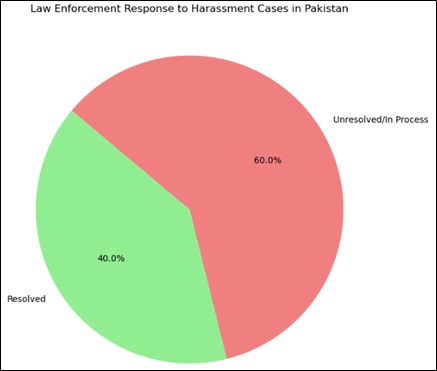Unveiling the Dark Side of Digital Progress: A Study on Technology-Facilitated Sexual Violence
Keywords:
Digital Sexual Violence (DSV), Technology-Facilitated Sexual Violence (TFSV), Image-Based Sexual Abuse, Cyberstalking.Abstract
The rapid expansion of digital platforms has revolutionized communication, offering significant benefits by bridging geographical gaps with unprecedented efficiency and immediacy. As of July 31, 2022, 88.1% of Pakistan's population, totaling 8,945,900 individuals, are internet users, reflecting the widespread adoption of digital technology. However, this digital connectivity has also introduced new forms of interpersonal violence, particularly in the realm of sexual violence. Digital Sexual Violence (DSV) encompasses behaviors conducted through digital means—such as email or cellphones—that are perceived by the victim as unwelcome and harmful. These behaviors range from inappropriate comments and threats to harassment and sexual blackmail. The internet, with its relative lack of regulation, provides an ideal environment for such misconduct. Technology-Facilitated Sexual Violence (TFSV) includes various forms of harm facilitated through digital platforms, categorized into digital sexual harassment, image-based sexual abuse, coercion or sexual assault, and harassment based on gender or sexuality. Despite extensive research, clear definitions for cyberstalking and digital sexual harassment remain elusive, complicating efforts to address these issues comprehensively. Studies reveal significant impacts of TFSV, including a 62.3% prevalence rate of sexual harassment among a sample of 2,956 Australian adults, with 21.3% reporting repeated unwelcome sexual demands. Image-Based Sexual Abuse (IBSA), often involving non-consensual dissemination of intimate images, and sextortion are critical concerns. Although commonly referred to as "revenge pornography," IBSA encompasses broader abusive behaviors, including the use of threats to coerce victims. The study highlights a gap in research regarding adult TFSV victims, particularly in Pakistan. The lack of comprehensive data underscores the need for targeted research to understand the frequency, characteristics, and predictors of TFSV victimization. This study aims to fill these gaps by investigating the prevalence and nature of TFSV among Portuguese adults, examining sociodemographic factors, internet usage patterns, and specific behaviors experienced by victims. The findings will inform the development of effective prevention and intervention strategies tailored to the Portuguese context.








